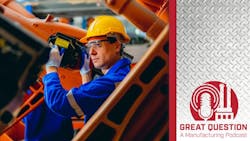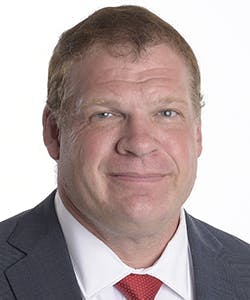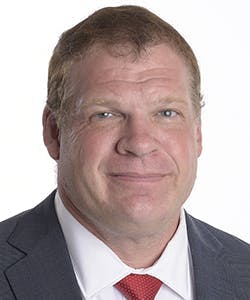Podcast: How Mayor Glenn Jacobs is driving manufacturing growth and innovation in Knox County, Tennessee
Glenn Jacobs is the Mayor of Knox County, TN. Heavy industry in the State of Tennessee is booming, especially automotive, and Knox County has added more than 2,500 jobs and seen $217 million in capital investment under the leadership of Mayor Jacobs. In this podcast, Plant Services chief editor Thomas Wilk gets in the ring with Mayor Jacobs to talk about several projects that are growing this manufacturing and industrial base.
Below is an excerpt from the podcast:
PS: I've been looking forward to this since we connected back in March at Bill Leahy's Unturning Steel program, and that was a program specifically focused on helping U.S. veterans transition from active service to private sector industry jobs. When you and I met, you described the influence that your father's work and service experience had on you, and that really was powerful to me. Can you share some of that story with our listeners?
GJ: Sure, my dad is a 21-year military veteran. He served in the Navy for 10 years, he was in the Korean War on the USS Antietam aircraft carrier, then switched services to the Air Force. I was actually born at Torrejón Air Base in Madrid, Spain, and Dad went to Vietnam after that.
Then we went back to the states. He retired when I was about four years old, and we moved to rural northeast Missouri. Dad's work in the military had been airplanes, I mean aircraft carrier, then Air Force. He was the load master on the C130 cargo planes. And you know, where we lived, there wasn't an airport or anything like that, so Dad kind of bounced around with factory jobs and those sort of things when I was very small. Eventually he ended up getting a job with the Postal Service, he was a Royal Mail carrier.
On the one hand, because of his military retirement, we always did OK. But, without that kind of skilled trades that weren't transferable or translatable to a lot of things in the private sector, he was at a disadvantage, I think, just with his skills. Dad worked really hard, don’t get me wrong, it just is what it is. And that's what impressed me so much about Unturning Steel program, was the fact that you're working to give veterans the skills that are necessary for them to thrive in a modern manufacturing environment.
And it is completely different now – if you've ever been on a modern factory floor, it's no longer an assembly line where people are putting nuts on bolts and putting parts on products they move along the line. Robots are doing all those things, so those (manufacturing) skills now have become much more high tech than they were even just a few years ago. That's something in Knox County that we're concentrating on, our Chamber calls where we're going the “imagination economy” with just how much the world's changing. And the skill set that is necessary is different. It's much more high tech than it has been in the past. All those things combined together have really had a big impact on what I see as the necessary skills that folks need to survive in the modern world in the modern economy.
PS: It's really something to have witnessed your father make that transition. As you said, he worked hard and he was skilled for jobs, but the formal part of that transition wasn't really in place, where there weren't programs easily available in place to facilitate that.
GJ: Exactly that. That's exactly right.
PS: You took office in 2018. When you took office and ran for office, what were some of the goals that you had for Knox County specifically to grow the manufacturing and industrial base?
GJ: One of our big projects and something I'm really proud of that we've been able to launch is the Skilled Trades Academy and Regional Training Center, which is based around construction trades. There's huge opportunities there. For every four skilled craftspeople that are leaving the workforce, there's only one person there qualified to take their place, so that causes issues, not only for the employers, but you know, one of the reasons that housing prices are going up so much is because the labor costs are so expensive now. But there are tremendous opportunities there, that's one of the things that we really looked at, so I'm very proud of that.
We also work with our local Tennessee College of Applied Technology. It's basically the states vo-tech program. They do wonderful work with things like welding, machining, and other occupations. Our schools are also switching how they do things now, and they're going to an academy model where the different high schools specialize basically in different career pathways, as opposed to everybody the same stuff, and you have a few electives here and there you can pick. The young people and their families are much more able to tailor their educational experience to what they want to do with their life and hopefully get ahead of the game.
One of my favorite things is, I try to go to all Knox County high school graduations every year. Don't always make it, but I try. And one of my favorites is we have a school called the Career Magnet Academy, and these kids are dual enrolled at the high school, but then also at Pellissippi State Community College, which is our state's biggest community college and their campuses are right here in Knox County. Some of those kids actually graduate with an associate’s degree from Pellissippi State before they get their high school diploma. They will have graduated a few weeks from Pellissippi State with a certification or associates degree, and then they actually get the high school diploma. And of course those hours, can not only be used just to go straight into work, but they're also transferable to a four year university, or to whatever. And I think that's really the way that our overall education system needs to go now because again, things are just evolving so rapidly, and especially for young people having those skills at a very young age, at least coming out of high school, I think is extremely beneficial for them.
What we've tried to do is really concentrate on workforce. Nowadays, companies aren't necessarily looking for sites, OK? It used to be that, “we need a big building and some land around it.” They're much less interested in that now than they are “do you have the workforce necessary to fill the jobs that we're bringing?” which again goes back to having a competent, technologically proficient workforce. I consider that kind of our job, is to work with schools and our education system to provide that workforce, so the companies that are already here and want to expand can, but then we're also attractive to companies which bring opportunities for better lives for the people who live here in Knox County and the surrounding areas.
PS: It's good to hear that pipeline being built out right down to the high school level. That's something that's been missing for a while. Even up here in Chicago, at my son's middle school, they have a careers program in place where they are treating all careers equally. There's the doctors and lawyers track, and there's a teachers track, but also the manufacturing track too. Some of the city colleges in Chicago, there's one dedicated to smart manufacturing. It’s about time the nation's built out this pipeline again.
GJ: Frankly, that's what our country has to do to remain competitive in the 21st century. It just is, when you think about how things have changed. You know, I was talking with a friend of mine who is big in the nuclear industry, and here in Knox County we have a huge asset, we're only about half an hour away from the Oak Ridge National Laboratory, which is one of the world's foremost nuclear energy research institutions.
He made a great point, is when we're talking about workforce with nuclear and then many other technologically advanced sectors of the economy, the engineers, they make a lot of money and you can hire them to come here because you don't need that many. But most of the workforce is actually made up of technicians, right? And those people already have to be there because you have to have so many of them that it becomes cost prohibitive to say, hey, we're going to bring, you know, 100 people here to be to be our technicians. Our education system has to be producing those already.
It's the same at the Oak Ridge National Laboratory. You know, you have tons of Ph.D.s out there. But more than half their workforce is technicians, the people that actually do the day-to-day work. It's the same with construction or anything else. You have the folks that do design, and you have the folks that actually build it, and there's a lot more of the folks that build it than there other people that design it. And both are equally important.
Read the rest of the transcript
About the Podcast
Great Question: A Manufacturing Podcast offers news and information for the people who make, store and move things and those who manage and maintain the facilities where that work gets done. Manufacturers from chemical producers to automakers to machine shops can listen for critical insights into the technologies, economic conditions and best practices that can influence how to best run facilities to reach operational excellence.
Listen to another episode and subscribe on your favorite podcast app
About the Author

Thomas Wilk
editor in chief
Thomas Wilk joined Plant Services as editor in chief in 2014. Previously, Wilk was content strategist / mobile media manager at Panduit. Prior to Panduit, Tom was lead editor for Battelle Memorial Institute's Environmental Restoration team, and taught business and technical writing at Ohio State University for eight years. Tom holds a BA from the University of Illinois and an MA from Ohio State University


